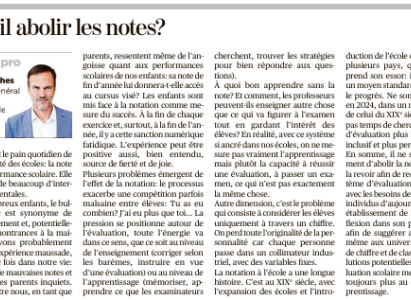For many children, the school report card is synonymous with stress, judgment, and, potentially, scolding at home. Most of us have probably had this gloomy experience at least once in our lives: coming home with bad grades and facing anxious parents. Some of us, as parents ourselves, even feel anxiety about our children's academic performance: will their final grade allow them access to the desired course of study? Children are faced with grades as a measure of success. At the end of each task, and especially at the end of the year, there is that fateful numerical judgment. The experience can, of course, also be positive, a source of pride and joy.
Several problems arise from the effects of grading: the process fuels sometimes unhealthy competition between students: "What did you get? I scored higher than you..." Pressure builds around assessment, and all energy becomes focused on it, whether in teaching (marking to rubrics, instructing with the test in mind) or in learning (memorizing, figuring out what examiners want, developing strategies to answer questions effectively).
But what's the point of learning without grades? And how can teachers teach anything beyond what will be on the test while still keeping students engaged? In truth, within this deeply embedded system, we are not really measuring learning, we are measuring the ability to succeed on an assessment, to pass an exam, which is not quite the same thing.
There’s another concern: reducing students to a single number. We lose sight of their unique personalities because each person is filtered through an industrial lens, with fixed variables.
Grading in schools has a long history. It gained traction in the 19th century with the expansion of schools and the introduction of compulsory education in many countries: there was a need for a standardized way to measure progress. But in 2024, aren’t we living in a world vastly different from the 19th century? Isn’t it time to explore a more holistic, inclusive, and relevant system of assessment?
Ultimately, the question is not necessarily whether we should abolish grades, but whether we should rethink them; redesign the evaluation system to better reflect the needs of today’s society and individuals. Each school should begin this reflection within its own context and propose potential solutions to the authorities, and even to universities, which are so fond of numbers and rankings, so that academic assessment can place the learner more firmly at the center of the learning experience.
Conrad Hughes, Director General (article originally published in French in La Tribune de Genève)
